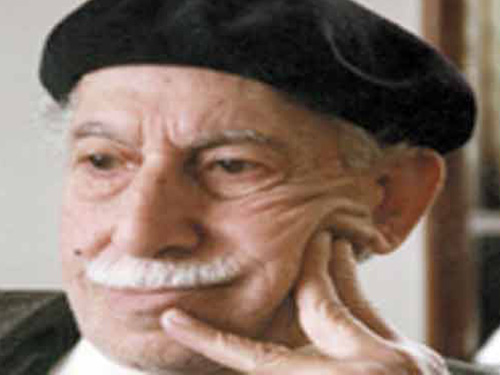Amina Rachid, the critic, university professor and writer who was always faced difficult choices prefers to work quietly away from the spotlight. To Amina Rachid, a new compilation, with a forward by Randa Sabri and Rania Fathi, honors Rachid.
The book, published by Al-Ain Publishing and selected by the French Department at Cairo University’s Faculty of Arts, is dedicated to an Egyptian woman who is sincere in her choices and steadfast in her positions.
This massive book includes pieces in Arabic, French and English. Though intended for the layman and published by a non-academic publisher, 324 pages of the book are in French and English while only 63 are in Arabic.
Still, the effort to pay tribute to Amina Rachid is praiseworthy. A quick glance at Rachid’s life reveals how much this woman is a unique example.
The granddaughter of Ismail Sidqi, Egypt’s prime minister and famous dictator during the monarchical era, she was linked to the underground leftist movement since she was 17.
Rachid graduated from the French Department of Cairo University’s Faculty of Arts in 1958. Between 1962 and 1968, she held a scholarship to complete her PhD at the Sorbonne University in Paris. Between 1970 and 1978, she was appointed to one of the most skilled scientific positions in France’s National Center for Scientific Research. In the same year, however, Rachid decided to return to Egypt to work as a teacher in the French Department at Cairo University, refusing to be dazzled by the idea of working at such a reputable center.
While Rachid may have not produced a prodigious number of books, in Arabic or French, her academic and research contributions cannot be overlooked. Rachid supervised many theses, and organized and participated in numerous conferences, seminars and workshops.
Rachid, who has robustly defended freedom of expression, was also steeped in public service. She was a member of the Committee for the Defense of National Culture from 1978 until her detention in September 1981. In the same year, Rachid co-founded a magazine called Khatwa.
Many of Rachid’s contributions to periodicals, conferences and seminars have yet to be published. It often seems like the extremely modest Rachid had a preference for "field" academic work that would benefit generations of critics and researchers to come.
This honorary book includes a testimonial by her husband and fellow critic Sayyed el-Bahrawy. His warm and genuine words truly capture the beauty of Rachid’s personality.
"She has the ability to understand and feel the other deeply. This is definitely a positive trait, even though it can turn into a negative one when associated with the value of tolerance–that kind of tolerance which emerges from an understanding of human weakness. More often than not such tolerance would eventually be at her very own expense," says her lifetime partner.
Sayyed and Rachid were married in 1981, after being engaged in prison following Rachid’s arrest in September of that year. Sayyed says that Rachid’s research projects are "numerous but they never accomplish their objective because she is never satisfied with what she writes. As such, research remains to be an end in itself. Many of her books are finished or almost finished yet not published…those books and studies published for her represent only a small fraction of her unpublished work."
In her testimonial on Rachid, renowned novelist Mai el-Telmesany delves even deeper into the human side of Rachid. She says: "When I lost my daughter upon her birth, she came to see me with Sayyed. They were among the first friends I allowed in for a visit. We all knew that sadness is a strong tie that binds us together, so I was able to cry in their presence without feeling embarrassed."
El-Telmesany continues: "Rachid listens a lot and talks little. As usual people listen to her well. Rachid struggles in defense of her ideas and she never boasts about it. You can see her as Tahani Rashed in the movie Arba Nisaa min Misr (Four Women from Egypt) and can therefore predict that she is going to prison after Sadat carried out an arrest campaign that targeted Egypt’s intellectuals…she speaks to the officer as though he were a relative of hers, but feels bitter hearing him call her ‘sister,’ for oppression blurs the differences between a prisoner and a prison warden. That movie paints a portrait of Rachid. We can see Rachid through her friend, who has the same deep voice, French accent and clear understanding of their roles…"
El-Telmesany wraps up: "I picture Rachid’s everlasting shy smile, her compassionate eyes looking at me from behind her glasses, her short, white hair which reminds me that Rachid is a happy and passionate grandmother who visits her grandson in Paris regularly."
In her testimonial, critic Feryal Gabbouri Ghazoul touches on yet another of Rachid’s traits that make her such an admirable and esteemed woman: "She has this extraordinary ability to make those harder decisions, and to resist the more common and predictable options. Rachid steers clear of making easy, usual choices, opting instead for bumpier roads and more promising ends. Not only did she have to confront others with her own choices, but she also had to challenge herself as well. Rachid devotes all her energy to what she believes in."
Ghazoul adds that Rachid’s decision to resign from her prestigious position as a researcher at the national center for scientific research in Paris–a position which she won after intense competition with eminent researchers–provides proof that Rachid wasn’t after career advancement but rather human development. Accroding to Ghazoul, Rachid is biased to the poor, is both solid and tender, which makes her a fine intellectual and a role model to whom colleagues and students turn for guidance.
In her testimonial, Ghazoul points out the tremendous effort exerted by Rachid when preparing her PhD thesis about a French medieval thinker. Rachid spent 12 years putting together this thesis, which was never translated or even published in French. "It’s a 1000 page unpublished encyclopedic research effort," Ghazoul laments. It’s not that kind of theoretical research that is disconnected from Rachid’s interests, for it is related to the impact Arabs had on Europe, she adds.
In her foreword, Rania Fathi says that testimonial literature is an area of research that Rachid has been thrilled about.
One of the most important testimonials published in Arabic is that by distinguished poet Mourid el-Barghouthi. His testimonial very delicately touches on how general concerns and the world of literature are intimately intertwined. Amazingly, he blends his personal life–his experience as a writer and philosopher–with certain views on existence. I now feel that I know him like never before.
Finally, I recommend the publishing of another book about Amina Rachid, in Arabic this time, for the ordinary reader. For Amina Rachid deserves that honor, for her great and significant human and scientific value.
Book: To Amina Rachid
Compiled and fore-worded by Randa Sabri and Rania Fathi
Publisher: Al-Ain Publishing,(Cairo,2010)
397 big-size pages




